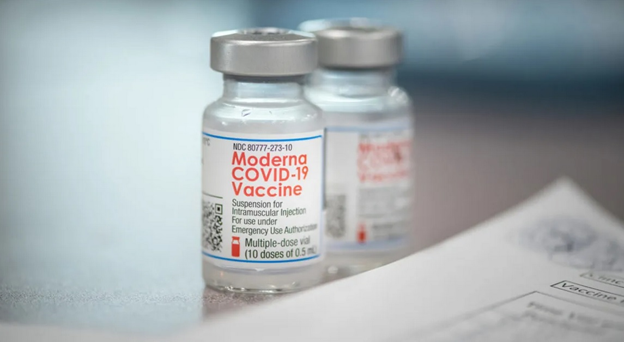Bill of Health
Last month, the patent battle between COVID-19 mRNA vaccine manufacturers continued with BioNTech/Pfizer filing a strong defense and counter-claim to Moderna’s allegations of patent infringement.
In their initial August 2022 complaint, Moderna alleged that three of its mRNA patents were infringed by Pfizer/BioNTech. Interestingly, as of January 12, 2023, Moderna has listed 10 patents covering Spikevax (its mRNA vaccine) on its website. Since biotechnology inventions can be covered by several patents, each of which may not be easy to identify through public searches, the decision to publish a consolidated list of patents is a move in the right direction. However, the list is an evolving one, and, as it happens, one of three patents at issue, i.e., patent no. 10,933,127 (‘127) has not been listed.
The following article explains the key patents at stake in the intellectual property dispute.
Moderna’s first infringement claim:
Patent no. ’574: Through which Moderna claims exclusive rights to the 1-methyl-pseudouridine modification to mRNA (mRNA modification).
Pfizer/BioNTech’s response:
Pfizer and BioNTech claim that Moderna is misappropriating the hard work and independent research performed by an entire field of research in the years before COVID-19 emerged.
Indeed, since the 1970s, scientists have recognized that mRNA can induce protein expression to treat or prevent disease in humans. In mid-2000s, Drs. Katalini Kariko and Drew Weissman of the University of Pennsylvania made foundational discoveries that overcame critical problems plaguing the use of mRNA in drugs. They discovered that certain chemical modifications to mRNA (the 1-methyl-pseudouridine modification) and certain purification techniques (high-performance liquid chromatography) could reduce dangerous immune responses. In 2005, they published their research and insights in a series of research papers and also filed a patent application disclosing this modification (which eventually issued as patent no. 966).
This is the same modification that Moderna now claims exclusive rights over. However, this discovery was made much before Moderna’s patent application and even before Moderna was incorporated.
The founders of Moderna were aware of Drs. Kariko and Weissman’s work and even lauded their discovery. Moderna also licensed their mRNA technology from Cellscript LLC – University of Pennsylvania’s successor-in-interest to the 966 patent. As claimed, Moderna also learned purification techniques from Drs. Kario and Weissman.
Moderna’s other infringement claims:
Patent no. ’600: Through which Moderna claims exclusive rights to mRNA encoding for the full-length spike protein in a lipid nanoparticle formulation (LNP) (full-length spike protein and LNP).
Patent no. ’127: Through which Moderna claims exclusive rights to a method of administering mRNA encoding the full-length spike protein in an LNP formulation.
Pfizer/BioNTech’s response:
- Lipid nanoparticles: Lipid nanoparticles are particles that encase mRNA structures for delivery into cells. Pfizer and BioNTech claim that Moderna is attempting to take credit for a broad discovery of lipid nanoparticles that it did not make. The components and ratios of the LNP technology used by Moderna claim to have been disclosed in a prior international patent application no. 2010/144740 and in the 966 patent. Moderna is currently being sued for patent infringement for the use of certain third party LNP technology.
- Encoding the full-length spike protein: BioNTech and Pfizer claim that the broad concept of encoding for the full-length spike protein was not a new discovery made by Moderna. By 2009, before Moderna’s patent application, scientists knew that the full-length spike protein is highly immunogenic and can be used to induce protection against certain viruses.
Further, Moderna’s patents are indefinite and over-broad, as they claim the full-length spike protein in general, without disclosing an actual mRNA vaccine that encodes a SARS-CoV-2 protein.
BioNTech and Pfizer also claim that Moderna ignores the contributions of NIH scientists. It has been reported that NIH scientists were the ones who discovered that a particular alteration of the sequence of the coronavirus spike protein stabilizes the spike protein and allows it to be used by human cells to elicit an immune response.
The big picture: are Moderna’s patents even enforceable?
In October 2020, Moderna pledged not to enforce its patents amid the ongoing pandemic.
The company revoked its patent pledge on March 7, 2022, and the infringement claim against Pfizer/BioNTech came shortly after. But, in their response, Pfizer and BioNTech allege that Moderna knew that the pandemic was not over even when revoking its pledge. As highlighted in Pfizer/BioNTech’s response, Moderna continued to make statements that “the fight’s still going on” as recently as September 2022.
Since the pandemic is not over, and because Moderna pledged not to enforce its patents for the duration of the pandemic, BioNTech and Pfizer argue that Moderna has granted an implied license to third parties.
More broadly, BioNTech and Pfizer highlight Moderna’s surreptitious conduct of obtaining its mRNA patents without disclosing the government’s role in its funding and development. Indeed, as made public, the U.S. government committed more than one billion dollars to Moderna for development of its COVID-19 vaccines. Moderna has since made over $30 billion in COVID-19 vaccine sales.
To access the original article click here.









